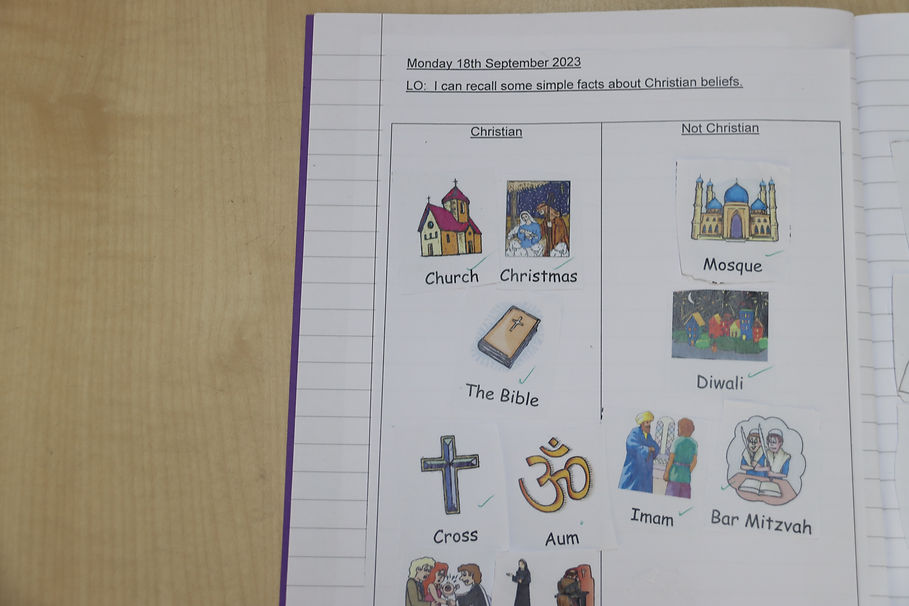
R.E.
Scroll Down

Miss Henry
My name is Miss Henry. I am the Religious Education leader at MCPA. Leading and teaching RE continues to develop my
understanding of different religions and world views. Discussions with our children are really interesting as this gives me an insight
into their personal experiences, views and traditions. RE is a vehicle not only deepening children's understanding of other cultures
and religions but encouraging them to value and respect our differences.
British Values
Promoting social and ethnic harmony and awareness of British values is a moral imperative for schools and RE has a significant
contribution to make to this. Through the exploration of multiple identities and local communities, through visits to places of
worship and meeting people from religious and belief communities, and through a deepening understanding of beliefs and practices,
our aim is for young people to come to an informed and empathetic understanding of different groups which will help promote
cohesion and integration. Pupils will explore British values in relation to religions and beliefs.
.
Cultural Capital
RE can make a contributes to Cultural Capital through:
• Incorporating works of literature/art/music into lessons and resources – from a range of traditions.
• Allowing pupils to see beyond their own cultural experiences.
• Encouraging open-ness in sharing cultural experiences.
• Challenging stereotypes of the ‘other’.
• Encouraging curiosity and enthusiasm for learning about culture and cultures.
• Enriching the curriculum through encounters with a range of people.
SMSC
Spiritual Education in RE involves the experience and search for meaning, the purpose of life and the values by which we live.
In learning about a range of different religious traditions and why people believe, students that the opportunity to learn from their experiences, to reflect on and interpret spirituality in their own lives and to reflect on ultimate questions
Moral Education in RE allows students to learn about shared and differing moral values from religious and secular perspectives.
RE provides opportunities for students to debate moral dilemmas about right and wrong, good and bad.. RE encourages students
to discuss ideas such as people's responsibility towards the world.
Social Education in RE involves exploring the similarities and differences in religions and cultures through which students make
links between faith and personal action in everyday life. This is reflected in their relations with others through activities such as
discussion and debate, and in their ability to work cooperatively with others.
Cultural Education in RE includes learning about a range of different religious traditions, giving students an opportunity to learn
what it means to belong, to become confident in themselves and be able to respond positively to similarities and differences in
our changing multi-ethnic and multi-faith society.
Personal Development
Religious Education develops the knowledge, skills and understanding to explore truth, morality, humanity; building capacity
for making moral judgements and for evaluating different types of commitment to make positive and healthy choices.
RE prompts challenging questions about life, about belief, issues of right and wrong and what it means to be ‘good’ human.
Through MCPA’s RE curriculum we support pupils in developing their knowledge and understanding of principal religions,
comparing and contrasting religious traditions and world views.
Promotion of each pupil’s self–worth is an underpinning feature of our approach; supporting and enabling children to reflect
on their uniqueness as human beings, to share their feelings and emotions with others and appreciate the importance of forming
and maintaining positive relationships is key to establishing a positive and mutually supportive school community.
At MCPA we believe that RE encourages pupils to develop their sense of identity and belonging; it enables them to flourish individually
within their communities and as members of a diverse society and global community. It encourages pupils to learn from different
religions, beliefs, values and traditions, while exploring their own beliefs and questions of meaning. Ultimately RE plays an important
role in preparing pupils for adult life, employment, and lifelong learning. It enables children to develop respect for
and sensitivity to others, promotes acceptance and understanding of all.
Trips and enrichment
-
Yr 1 Church visit
-
Yr 2 Mosque visit
-
Yr 3 Hindu temple visit
-
Yr 4 Jewish Museum
-
Staff, parents and children sharing personal experiences
